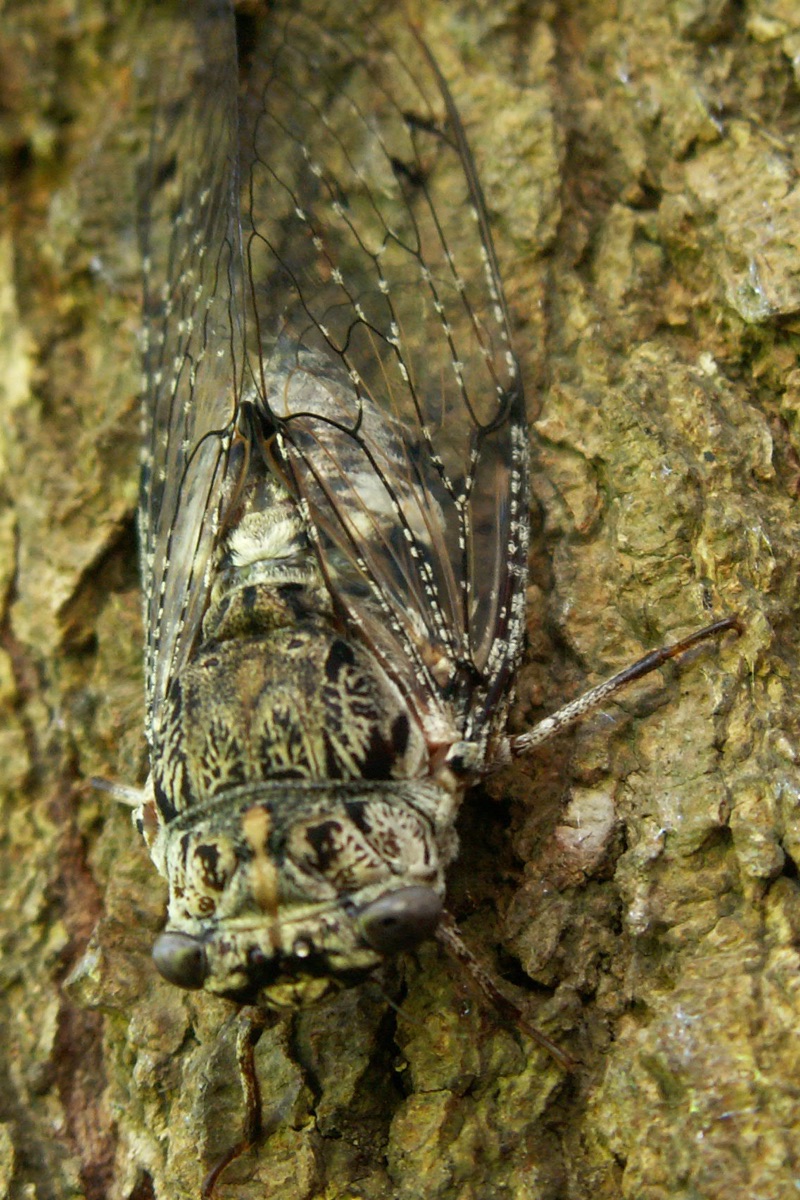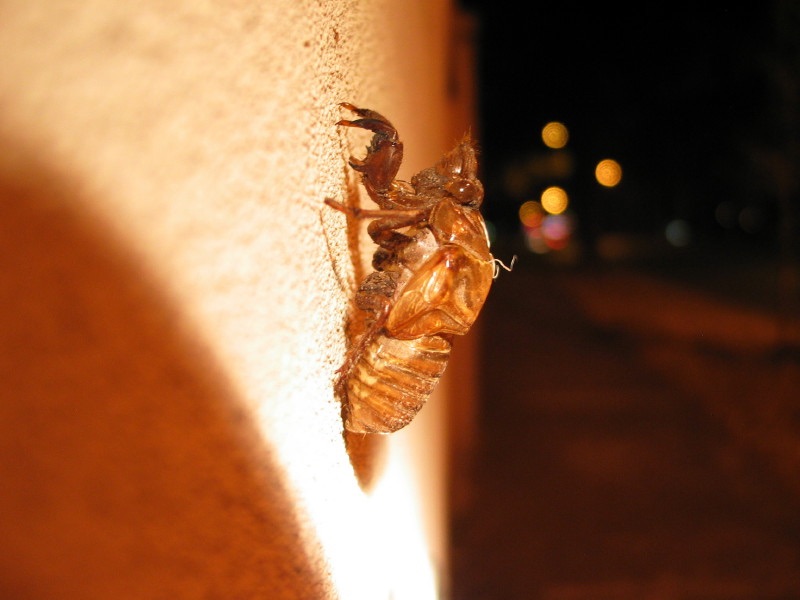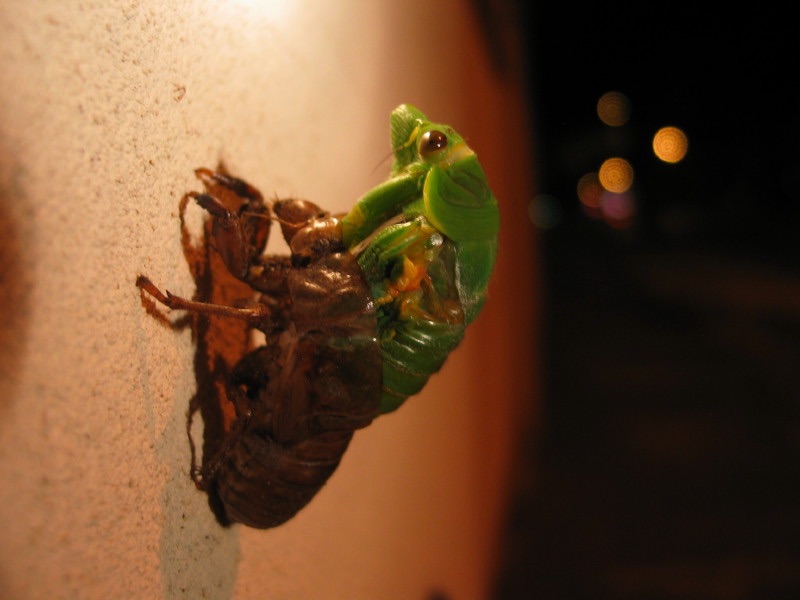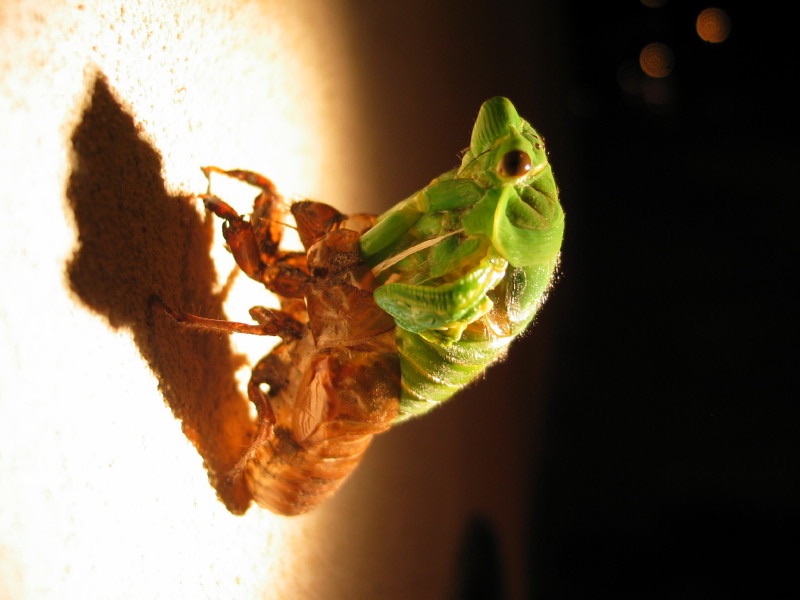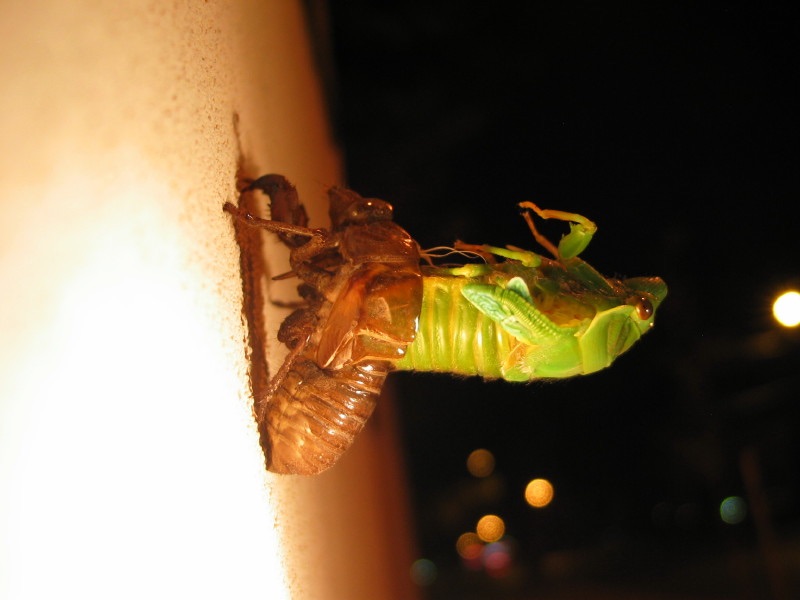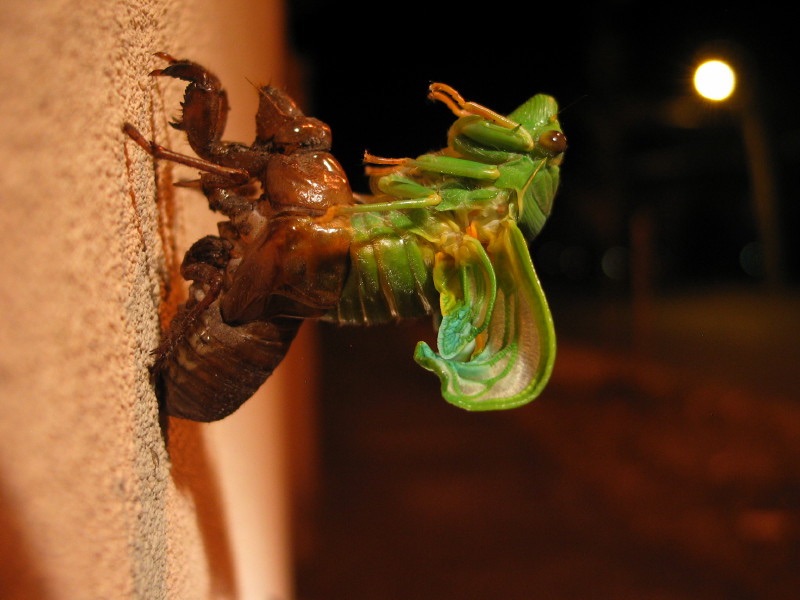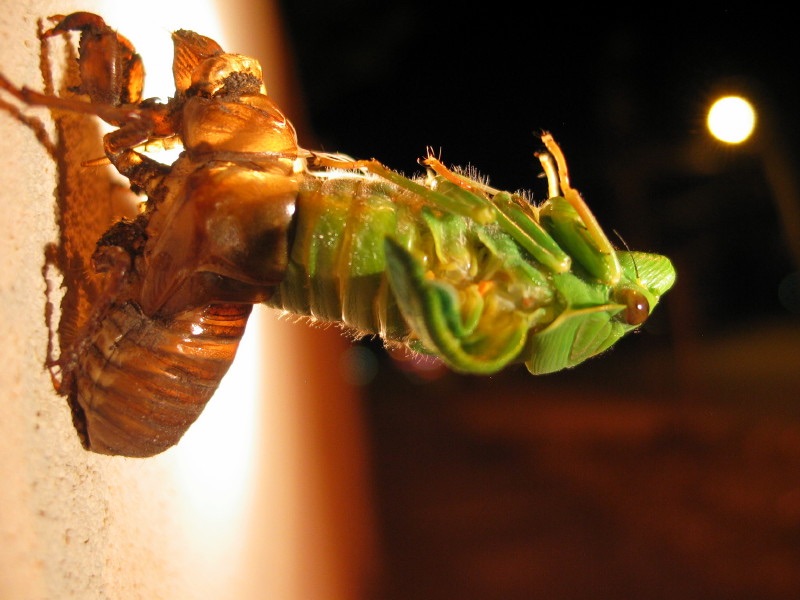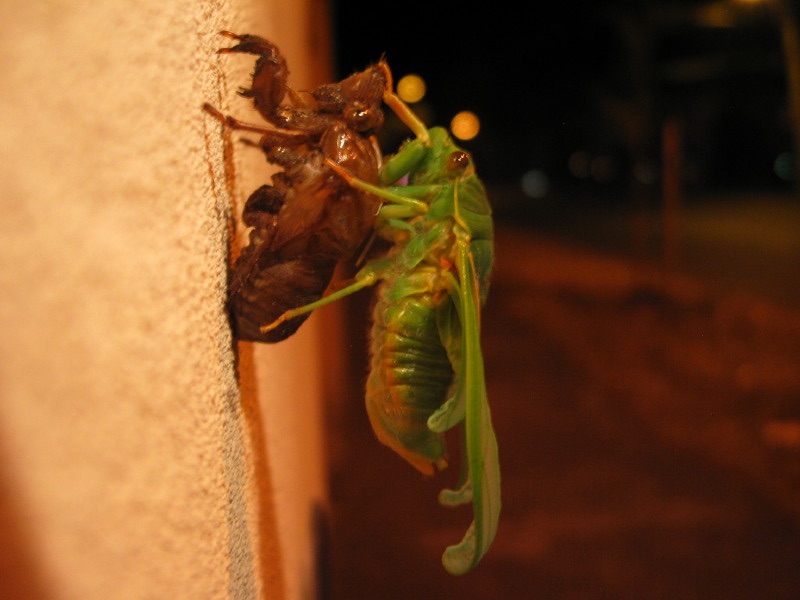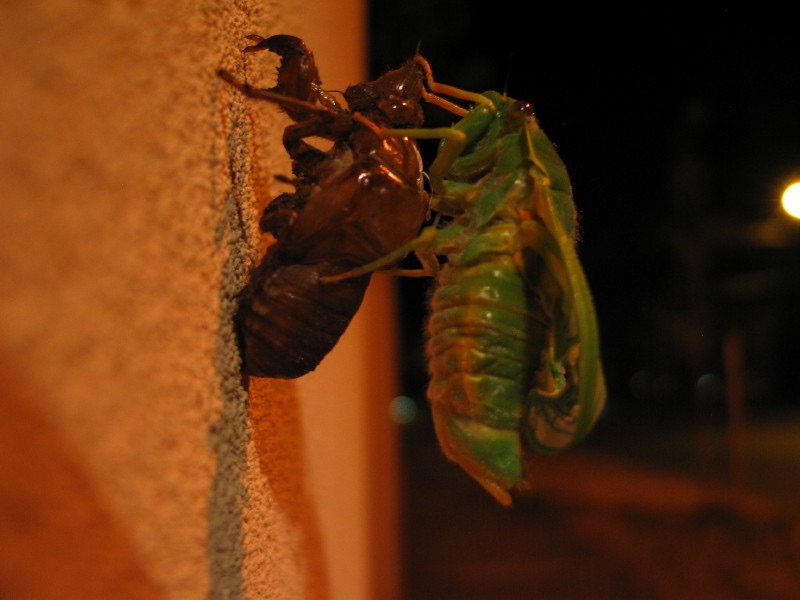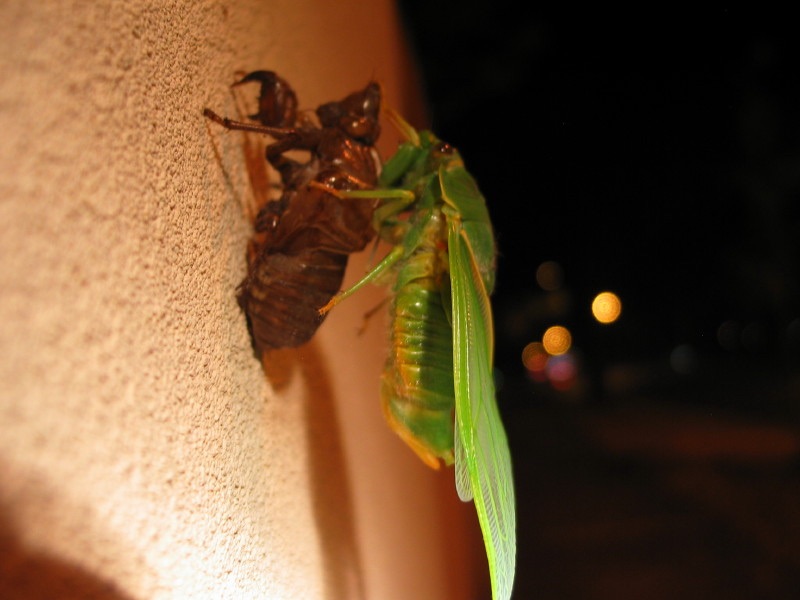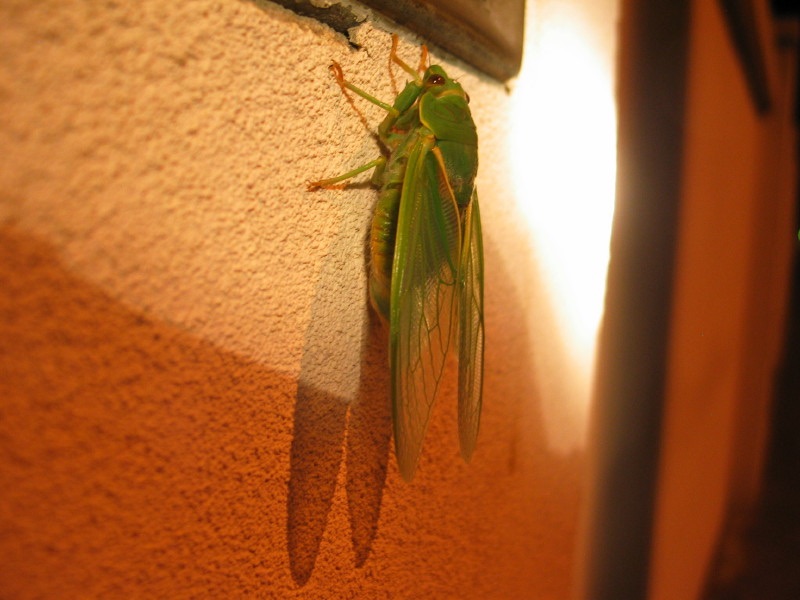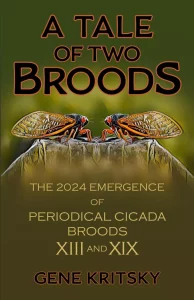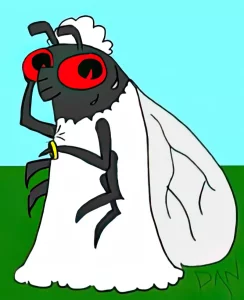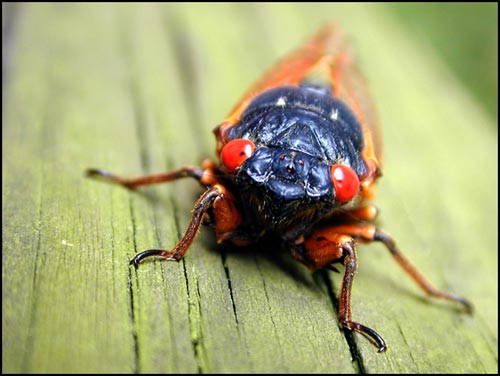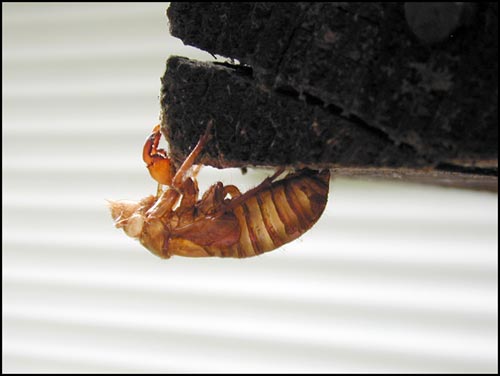These questions come from the old General Cicada Questions message board. The questions and answers are in reverse order. URLs found in comments are old and likely do not work.
Hi all Cicada Lovers, I myself love all insects. I have always been interested in insects. I have a website with insect links and photos. Enjoy
Comment by Bill D. — November 17, 2006 [AT] 9:18 am
I live in the Western subs of IL. I have an above ground pool. Will these little guys be a burden? When exactly do they come out and for how long? ew
Comment by Joyce — November 13, 2006 [AT] 8:56 pm
What are the different types of cicades??
Comment by hawill — November 11, 2006 [AT] 9:17 pm
I found this site when searching for cicadas.
There music kind of sounds like cicadas buzzing, at time.
Comment by Amazed — November 1, 2006 [AT] 7:18 am
I want to know what sounds a cicada makes. And do they make sounds 24 hours a day? How long will they make the sounds? I live in Georgia and I keep hearing the high pitch sounds.
Comment by Larry Gunnels — October 26, 2006 [AT] 8:06 pm
I’m posting again to publish my messenger ok…
brunomontanhez [AT] hotmail.com
Comment by Montanhez — October 12, 2006 [AT] 10:23 pm
im a biology student that was seeking for Quesada gigas pictures and then found this place! it’s looks really nice…congratulations
and….there’s any brasilian on this forum?
Comment by Montanhez — October 12, 2006 [AT] 10:21 pm
With these things it’s really the luck of the draw — they might be a no show, or they could make things miserable. It might pay to ask the owners of the property what happened 17 years earlier.
Comment by Dan — October 3, 2006 [AT] 7:57 pm
The wedding ceremony only will be in Willowbrook, IL, southwest of Chicago about 25 miles in our backyard which has trees and shrubs (but house and yard about 6 years old) and surrounded by property that has lots of trees and undisturbed (undeveloped) land. Based on reading the Wedding Planner which I found after posting my question, sounds like you need a sense of humor if you don’t reschedule. Seems it would be very distracting and take away the focus from the ceremony.
Comment by Yola — October 2, 2006 [AT] 2:28 pm
Depends on where the wedding is going to be.
Comment by Dan — October 1, 2006 [AT] 9:39 am
My daughter has planned an outdoor wedding in our backyear for 6/16/07. I think we should reschedule. Any comments?
Comment by Yola — October 1, 2006 [AT] 6:25 am
Chicago’s breed is due in June 2007. They will emerge around June 9 and will last about four weeks.
You can set your clock to that.
Comment by John — September 14, 2006 [AT] 2:19 am
Hi Anjum- your email address does not seem to be correct. Please correct for contact or email to >
David.
Comment by david — September 12, 2006 [AT] 3:03 am
for reserch purpes if need cicada i can provide you onlowest rates from Pakistan about 16 veraities are avail able contect rehmany2k64 at yahoo
Comment by Anjum — September 10, 2006 [AT] 5:28 am
Which month and approximately which week will the brood xiii cicada’s hatch their final molt in Chicago, Illinois?
Comment by Dario — September 4, 2006 [AT] 8:25 am
i didnt know what what outside but it was huge and then we caught it with its prey and there both still alive the the cicada is paralized, my daughter wants to bring it to school to show her science teacher and my question is how can i keep them alive and when with the cicada become un paralized?
thank you
angie
lake charles,louisiana
Comment by angie — September 2, 2006 [AT] 2:47 pm
We were having breakfast this morning on our screen porch and a large, strange bug was sitting on the outside of the screen. I suspected a cicada and a quick web search led me to this site. Sure enough, it’s a magicicada!
The kids and I enjoyed learning about cicada habits, although we’re curious about this particular cicada because it’s so late in the summer and we aren’t due for our cicada cycle until next year (we’re in Hartford, WI). We’ve decided that this one must be a scout.
Comment by The Ohm Family — August 26, 2006 [AT] 8:38 am
I wonder, if I can find frequency distribution of cicada songs.
Thanks for any hints.
Comment by Serge — August 24, 2006 [AT] 8:30 am
I am an insect collector and recently obtained two male cicadas of the same species in Las Vegas. Based on my extensive travels throughout southern Nevada and the Las Vegas area, it literally sounds as if there is only one local cicada species in the area-I only hear one that sounds like a constant buzz saw and no other “songs” of distinctive species. Can anyone out there list the prevalent cicada-genus and species-of the Las Vegas area?
Comment by Jeff Clark — August 23, 2006 [AT] 5:19 pm
I absolutely love the sound of cicadas. I still do, though I’m watching a very creepy “Higurashi no Naku Koro ni” (When the Cicadas Cry). It’s a Japanese horror anime with a deceptively cutesy art style, and cicadas are prominant in the closing credits. The distinctive sounds appear in the soundtrack and now we get a delicious little shiver when evening falls and the cicadas begin their symphony.
But they *are* summer nights (and days) to me!
Comment by Laura — August 23, 2006 [AT] 10:40 am
okay so I KNOW these insects are called cicadas, and I love them dearly — my mother tells me she could hear them singing when I was born (july 25), so for me, hearing them is something akin to the primal scream….
But WHY did we call them “locusts” in Cleveland where I grew up? I don’t think I learned to call them cicadas until I moved to NJ in 10970.
second question: my own personal rule of thumb, based on observation, is that cicadas don’t “sing” unless the temperature outside is 70 F or above — is that true?
Kathy Harsany
cicada (and katydid) fan
Greenwich, CT
Comment by kathy harsany — August 22, 2006 [AT] 12:50 pm
Hi there
i have a diana maple it one year old,two weeks ago the leaves were brown and wilted they were flexable now their crispy and falling.I was told that there could be a fungus.Could there be a fungus,the tree is kept watered.
Comment by Joan Bowers — August 19, 2006 [AT] 9:05 pm
I live in Indianapolis, IN. Why do we have so many cicadas this year? I don’t remember the cicadas being this loud except for a couple of years ago.
Comment by William H — August 19, 2006 [AT] 5:40 pm
I’m so happy to find a site dedicated to this creature! Living in New York City, the cicada has become the sound of summer (along with ice cream truck bells and the drone of air-conditioners.) However, this summer, I’m sad to say, the sound has been absent. Is this part of the 17-year cycle? I can’t remember a summer without the sound of the cicadas each morning and evening. On the hottest days they could even be heard during midday. I’ve lived in NYC 39 years and I’m hoping that no environmental factors have led to their elimination from this area. Please advise.
Comment by Joseph Scrivani — August 9, 2006 [AT] 6:49 am
How do you say this insects name.
Comment by Judy — August 9, 2006 [AT] 1:50 am
We live in upstate New York, just east of Albany. On returning from a seaside vacation the end of July, we noticed a very loud insect sound at dusk, continuing through the wee hours. We have not heard this before, and it is keeping us up all night. My husband thought it might be locusts, so I searched the web and now we think we have them. He said he found a dead one in our yard. Can anyone tell us how long to expect this racket? It is very disruptive. We are new to this.
Comment by Cassandra — July 31, 2006 [AT] 4:33 pm
I need to get a Cicada for Biology and I have no idea where to look. Where might I find one? And when should I look for one?
Comment by Elizabeth — July 18, 2006 [AT] 12:02 am
I found a cicada grub in it’s last instar (I think), where it’s emerged from hte ground as a bronze kind of pupae on legs. It was lost groping around aimlessly on the pavement in the baking sun.
I thought it should be moved into the foliage where it could take to a leaf….so I did just that, but I noticed it had white eyes unlike any others I’d seen (usually having brown or black eyes.
It also seemed very weak. Is it unusual for cicadas in this stage of development, to have white eyes? If so why?
Comment by dan — July 10, 2006 [AT] 12:10 am
Does anyone have any tips for preserving cicadas? I find our local Tibicens rather attractive and would like to “shellac” one. (An already dead one; I’d never kill one! It’s not at all hard to find corpses once summer gets into full swing here in VA.) Do you think I could just use clear-coat enamel, or would that damage the wings?
Comment by Khate — July 2, 2006 [AT] 9:08 am
My girlfriend is from England, and had never had any experience with cicadas, she calls them “screaming bugs”. We are here in missouri, and I never knew that there was a 17 year cycle. Thanks for the site, and info.
Comment by Josh — July 1, 2006 [AT] 7:44 pm
Hi Connor,
There are many different types of Cicadas in the United States. At least 150 different species. Other names that can also mean “cicada” that people say are as follows:
Locust
Dog Day Cicada
Harvest fly
Heat Bug
And even some species of cicadas can have their own nick-names. For instance:
Tibicen chloromera — “The Swamp Cicada”
Tibicen auletes — “The Scissor Grinder”
Tibicen lyricen — “The lyric Cicada”
Magicicada — “17 year locusts”
Hope that helps.
Gerry Bunker
Massachusetts Cicadas
http://www.mechaworx.com/cicada/masscic1.asp
Comment by Gerry — June 29, 2006 [AT] 9:05 pm
I have been asked by my teacher at school to find out another name for cicada. What are cicadas also known as?
Comment by Connor James — June 21, 2006 [AT] 10:40 pm
Hi Dan, Looks as though some useless spam did get through with mesage 66!! To Debbie (67), cicadas do not bite, they suck sap through a “rostrum” (straw) like mozzies. They are quite magnificently constructed and coloured with each species having a distinct song- not too ugly once you get to know them!! Just watch one emerging and you’ll be hooked!
Comment by david — May 30, 2006 [AT] 7:05 pm
do these UGLY creatures bite and if so what needs to be done for treatment. I am in texas
Comment by Debbie — May 28, 2006 [AT] 5:59 pm
Does anyone have information regarding where in Pennsylvania Brood XIV of Magicicada has emerged in the past? I know they’re due back in 2008 and I’d really like to see them. Please email me at BigEdK7 [AT] aol.com if you have any information.
Thank you,
Ed
Comment by Ed — May 22, 2006 [AT] 11:39 am
In school we are studing about the rain forest and Im serching for people to help the rain forest from being burnt and cut down. I know this coment probebly dosen’t mean any thing to you, but it means the world to me. One forth of our rain forest are gone, and they say all the medicans in the world are in the rain forset so we are destorying medicans that we need. Now I bet you don’t care, but seens you like insects I decided to write this letter to you. Thank you for reading it.
Comment by Emily — May 15, 2006 [AT] 2:24 am
Starting a new site, dedicated to the cause. Here in the Chicago area we will be seeing our little friends next June, 2007 and will be putting up images and videos. Until then, the website
http://www.seventeenyearcicada.com
will be up and running.
John
Comment by John — May 12, 2006 [AT] 11:48 pm
Cicadas seem to be pretty rare here in Nova Scotia. I’m looking for a source of cicada “remains” which are intact and in good condition. I am hoping to find 10-20 at least. This is for an arts project.
Only Cicadas who have “ceased to bee” please!
Kevin
Comment by Kevin — April 19, 2006 [AT] 3:47 am
I would have to say they were disturbed under the the trash box. I would think it would be very very unusual to see them this early. you are right, you probibly would not see any until at least late june-july
Comment by Matt — April 14, 2006 [AT] 3:10 pm
I live in Peterborough, Ontario, Canada, and we are just barely breaking into spring (snow last weekend, this week 20 degrees C in the day, nights around 0). No leaves on trees yet, and grass just barely poking out of the ground.
Today we found about 3 or 4 adult cicadas scattered in the parking lot — most of them squished, but one still feebly moving its legs. I’m assuming they are adults: about 1 1/2 inches long, a dark drab brown, almost looking a bit moldy. There was signs of a large trash box moved in the area, so perhaps they were under it, and were disturbed.
We usually only get cicadas in the hot part of July & August… any ideas what might be going on here?
thanks for helping with the mystery.
jeannine
Comment by jeannine — April 12, 2006 [AT] 8:25 am
What is it about the cicada’s that places them in the classification?
Comment by Chrissy — April 3, 2006 [AT] 12:39 pm
You must be suffering the Amphipsalta zealandica chorus in Feb. someone from Auckland complained on this site last year about thier niose. On hot nights, cicadas can sing at intervals during the night, which drives you crazy. The Aussie greengrocers will sing at about 4hour intervals (dusk, 10pm, 2am and 6am) just in case you want to listen. By the way, many cicadas are attracted to UV lights, especially on warm humid nights.
Comment by david — March 7, 2006 [AT] 2:30 am
btw Im in NZ and that would be understood not understoof sorry!! Im used to cicadas but not this many and they have never done this before, I cant find much info on this kinda thing, there are hundreds of them and driving me crazy at times like 3am :/
Comment by salacity — February 21, 2006 [AT] 4:56 am
Okay so I understoof that cicadas were not attracted to light? however tonight the first night of the couple of weeks they have been around this year they started attacking the windows and they were all over my deck its midnight here and I dont understand whats going on Ive never seen anything like it before, is this normal?
Comment by salacity — February 21, 2006 [AT] 4:54 am
Hi Marty,
The “green grocer” in Australia sings when the temp reaches around 18C, but many small species will not sing unless the sun is shining (no matter what the ambient temp).
David.
Comment by david — February 16, 2006 [AT] 10:43 pm
Does a Cicada start chirping at a certain air temperature? if so what is it?
Comment by Marty — February 12, 2006 [AT] 4:55 pm
